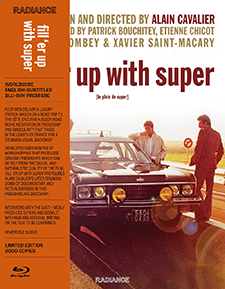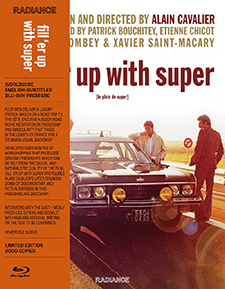Fill ‘er Up with Super (Blu-ray Review)

Director
Alain CavalierRelease Date(s)
1976 (March 7, 2023)Studio(s)
Les Productions de la Guéville/UGC (Radiance Films)- Film/Program Grade: B+
- Video Grade: A-
- Audio Grade: A
- Extras Grade: A-
Review
I must confess that director Alain Cavalier’s Fill ‘er Up with Super (Le plein de super, 1976) left me nonplussed. Ostensibly a road movie about four men driving across France to deliver an American-made station wagon to its rich owner, I found this male bonding story completely unrelatable (not that that’s a requirement) and the actions of its characters frequently perplexing and with no clear motivation or logic. Made in the wake of (and perhaps in response to) Bertrand Blier’s Going Places (1974), it’s also likened to John Cassevetes’s Husbands (1970), but while that latter film’s characters have very different personalities to mine, I found that picture more rewarding and satisfying. Fill ‘er Up with Super is well-made, but more a curiosity than anything else.
Car salesman Klouk (Bernard Crombey) is ordered by his boss to drive a new Chevy station wagon—complete with fake wood paneling, it’s a bit like the Griswold car in National Lampoon’s Vacation, though apparently exotically luxurious by mid-‘70s French standards—from Lille to its wealthy owner in Cote d’Azur. This puts Klouk on the outs with his wife; they’d been planning a weekend getaway. So instead, Klouk invites his best friend, Philippe (Xavier Saint-Macary), a male nurse, to accompany him.
At a rest stop they encounter Charles (Étienne Chicot), who seeks a ride after unsuccessfully trying to blackmail his father-in-law boss in the same parking lot. Klouk and Philippe intend to leave Charles behind after dinner at a bistro, where Charles shares an apartment upstairs with roommate Daniel (Patrick Bouchitey), but somehow they force themselves upon the other two, leaving Klouk and Philippe no choice but to continue their journey with Charles and Daniel riding along in the back seat. At first, Klouk and Philippe are eager to dump their unwanted passengers, and at one point they try to ditch them at a roadside café, yet by the end of the story the foursome have become inseparable.
It’s unclear to me why Klouk and Philippe would put up with Charles and Daniel. They threaten them with violence, are essentially broke and can’t pay their own way, and cause all kinds of distractions and problems. Charles, for instance, slips hashish into some food he offers Klouk. Soon after, with Klouk behind the wheel he becomes violently ill, with Charles and Daniel sadistically terrifying their driver as he hallucinates. At another point in the story, Daniel appears to have suffered a fatal fall off a bridge into a dry riverbed. The others, in full panic mode, rush down to render aid but—Ha-Ha—he was only foolin’. Some joke. Who’d put up with such nonsense?
Curious scenes abound. At one stopover, the car is mercilessly attacked by egg-throwing kids. Why? What’s their beef? At a rest stop, the four are having breakfast when Philippe is propositioned by a man at another table. The other three unaware, Philippe slips off to the man’s hotel room, and agrees to strip and take a shower while the man watches—no touching—for money. The deed done, Philippe happily pockets his dough and returns to his table. Was that a thing in 1970s France? Indeed, throughout this male bonding story are homoerotic elements—Charles and Daniel share clothes and compare underwear, for instance, yet all four have wives, ex-wives, or ex-girlfriends and delight in explicit talk about their favorite positions to “shag” them. When me and my male friends get together, we’re more likely to ramble on for hours about the latest Blu-ray releases.
Director Cavalier cast actors that were all students at the same drama school, writing the script together and filming its story over many months. If nothing else the comradery among them is undeniably natural-looking. Further, the foursome is undeniably fearless. Besides Saint-Macary’s shower scene, Étienne Chicot climbs out the back window of the station wagon, onto the roof, and back into the car through a side window while the car barrels down a highway at maybe 60kph, all without a stuntman.
Its capturing 1970s roadside France—its rest stops, highway restaurants and hotels, backwoods streets, mountaintop roads, is all visually interesting. Enough happens over the course of the film it’s never boring, just... curious.
Licensed from Gaumont, Radiance Films presents Fill ‘er Up with Super in its original 1.66:1 widescreen aspect ratio. With Radiance’s additional color correction, the image is clean and impressive throughout. In French with optional English subtitles, the 2.0 LPCM mono is likewise clear and restored. Region “A” & “B” encoded.
Supplements are mostly repurposed from French sources. These include Friends First and Foremost, a 28-minute interview with actor Crombey; My Wife Lives in Fear, It’s a Full House, and The Kind of the Bottle, all short films (less than 10 minutes each) directed by Cavalier featuring Fill ‘er Up cast members; Charlotte Garson of Cahiers du Cinéma presents an analysis of the picture that running 27 minutes.
Also included is a 28-page, full-color booklet, featuring essays by Murielle Joudet, Évelyne Caron-Lowins, and part of a 2011 interview with the director.
Fill ‘er Up with Super is definitely a case of “your mileage may vary.”
- Stuart Galbraith IV

